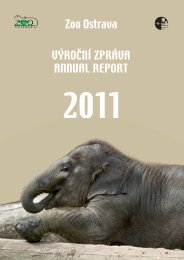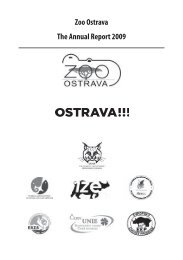European Studbook for Common Hippopotamus - Zoo Ostrava
European Studbook for Common Hippopotamus - Zoo Ostrava
European Studbook for Common Hippopotamus - Zoo Ostrava
You also want an ePaper? Increase the reach of your titles
YUMPU automatically turns print PDFs into web optimized ePapers that Google loves.
Plans <strong>for</strong> future housing of common<br />
hippopotamus in <strong>European</strong> zoos<br />
As a part of a questionnaire sent to the holders at the beginning of the 2009, I have asked <strong>for</strong><br />
their plans <strong>for</strong> holding the species. Six zoos (Amsterdam, Jerez de la Frontera, Kazan, Kyiv, Paris,<br />
Stuttgart) announced that they plan to stop holding common hippopotamus. Two other zoos<br />
(Knuthenborgh and Randers – both in Denmark) which do not hold common hippopotamus at this<br />
moment are interested in keeping the species in the future. Twelve zoos did not answer the<br />
questionnaire; however, since they cooperate well within the ESB, the current numbers of<br />
hippopotamus in those zoos were included in the following results.<br />
Based on the results of the questionnaire in total, 69 <strong>European</strong> zoos plan to hold common<br />
hippopotamus in the future and the <strong>European</strong> population would number more than 190 individuals.<br />
Three zoos plan to keep one adult animal and more than a half of zoos (35) plan to keep two adults<br />
only.<br />
The main problem <strong>for</strong> the future population seems to be a skewed sex ratio, which could<br />
reach 0.56:1 (males:females) according to the results of the questionnaire. Moreover, fourteen zoos<br />
(20 %) plan to keep one sex only and thus they will not contribute to the reproduction of the<br />
species.<br />
I can conclude that the data received from the questionnaire rises two questions <strong>for</strong> the<br />
stability of <strong>European</strong> population of common hippopotamus. First, the number of zoos contributing<br />
the reproduction of the species in the future will decrease. Since the transfers of adults are difficult<br />
and expensive, it can be expected that up to twenty percent of hippopotamus will not reproduce.<br />
Thus, the inbreeding could rise among population. Second, since holders prefer females to males,<br />
some zoos may want to stop reproduction to avoid a problem with placing a surplus male. Solving<br />
these questions would be necessary to stabilize the <strong>European</strong> common hippopotamus population<br />
means.<br />
18

















